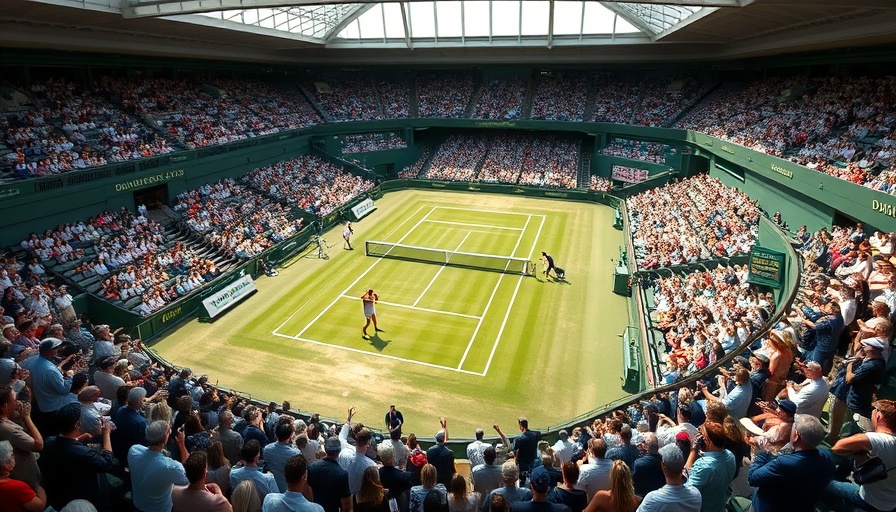
The Critical Role of Mental Toughness in Wimbledon 2025
An unexpected twist dominated the headlines at Wimbledon 2025, where mental resilience proved central to a player’s success. A staggering 23 seeded players witnessed early exits, with stars like Coco Gauff, Jessica Pegula, and Alexander Zverev succumbing to mental fatigue rather than mere physical prowess.
The tournament reflected a powerful reminder: performance hinges on psychological fortitude. Research consistently showcases that cognitive fatigue and the pressure of competition can severely diminish athletes’ performance capabilities. As noted by psychologists in sports, when faced with high pressure, decision-making abilities and motor skills can falter, which was evident in this year’s matches.
Why Mental Focus Matters
The stark reality of performance was illustrated by players like Coco Gauff, who, just weeks after a spectacular win at Roland-Garros, failed to meet expectations primarily due to mental stress. Gauff, ranked No. 2, reported feeling overwhelmed, resulting in multiple unforced errors that derailed her game.
Similarly, Jessica Pegula's loss to Elisabetta Cocciaretto revealed how crucial mental clarity is in executing tactical maneuvers. Even with a strong skill set, mental lapses can cripple an athlete's performance, highlighting the importance of mental coaching integrated alongside physical training.
Resilience as a Game-Changer
Conversely, players like Novak Djokovic and Carlos Alcaraz demonstrated the significance of mental toughness in their matches. Djokovic exemplified resilience, battling through illness without compromising his focus, culminating in his landmark 100th Wimbledon win. His performance under physical distress epitomizes the psychological strength required in elite sports.
On another front, Alcaraz showed exceptional mental agility, successfully regrouping after dropping early sets. His ability to reset and regain control during intense matches illustrates how critical mental fortitude is, enabling athletes to navigate through both self-doubt and external pressures.
Psychology's Influence on Coaching Strategies
Wimbledon 2025 has also seen a shift in coaching dynamics, with many coaches doubling as psychological support during games. This evolution underscores a broader trend where mental preparation is entwined with physical training. Effective strategies blend emotional intelligence with technical training, aiding players in coping with the psychological demands of high-stakes tournaments.
Coaches now focus on not only refining athletic skills but cultivating mental resilience as well, which resonates beyond tennis into broader leadership and executive challenges where stress and decision-making play crucial roles.
Beyond the Tournament: Leadership Lessons
The outcomes at Wimbledon serve as invaluable lessons for business professionals, especially for those in leadership roles. The concept of mental toughness transcends sports; it applies to the boardroom, where decision-making can be equally influenced by stress and mental readiness.
Executives can draw parallels from tennis players’ experiences, focusing on fostering resilience within themselves and their teams. Building a culture that prioritizes mental strength can lead to better performance under pressure, innovation, and overall team cohesion.
Practical Steps for Enhancing Mental Toughness
For executives looking to develop their mental resilience, consider the following strategies:
- Mindfulness Practices: Regular mindfulness training can enhance focus and reduce anxiety, equipping leaders to handle stress effectively.
- Reflective Journaling: This practice helps in analyzing experiences and emotions, leading to improved self-awareness and better future decision-making.
- Mentorship and Support Systems: Establishing robust networks can provide emotional and psychological support, vital for navigating challenges.
Understanding how mental strength manifests in sports can empower professionals to cultivate similar qualities in their leadership approaches, ultimately leading to enhanced organizational performance.
Get Ahead with Mental Fortitude
As we reflect on the remarkable stories from Wimbledon 2025, it's essential to remember that the intersection of mind and performance is invaluable, both in and out of sports. Embrace the principles of mental resilience, and consider how these lessons can translate into your leadership practices to foster a robust, performance-driven culture.
 Add Row
Add Row  Add
Add 




Write A Comment